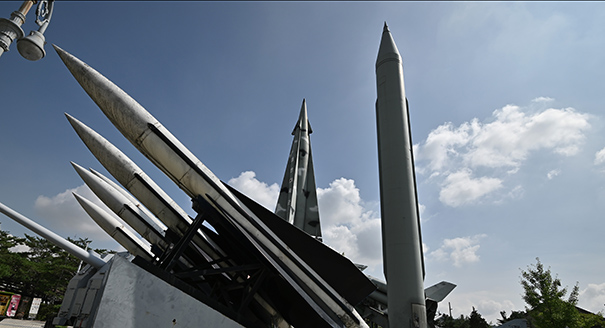Registration
You will receive an email confirming your registration.
International security and stability are facing new challenges with the increase of great power competition and the termination of key arms control treaties, which threaten to destroy the world’s existing cooperative security institutions. The future of traditional military alliances such as NATO is becoming more uncertain, while Russia and China are increasingly working together in areas of strategic security by conducting joint military exercises, air patrols, and cooperating on early warning systems. New challenges from regional players—including North Korea—continue to grow.
Tong Zhao moderated a discussion between Angela Kane and Li Bin, who assessed new developments in the European security landscape and how they may affect the Asia-Pacific region. Kane offered insights on whether lessons Europe learned in implementing cooperative security mechanisms, particularly arms control agreements, may be applicable to Asia and help mitigate key security challenges in the region.
This event was off the record.
Discussion Highlights
European Attitudes Toward Security: In a recent poll asking Europeans what they cared about most, climate change, not security, topped the list, followed by unemployment and migration. A panelist warned that Europeans risk taking security for granted following three decades of peace and political stability. Global developments continue to suggest that security–political, economic, and social–remains a primary issue. Several economic and political calamities have shaken Europe since the 2008 financial crisis, including the 2014 Russian annexation of Crimea, the ongoing conflict in the Donbas, the 2015 migration crisis, the rise of anti-establishment populism and far-right populist parties, and the 2016 Brexit referendum, all of which impacted European security.
Trump’s Impact on Europe: The panel noted the election of President Donald Trump as a game changer and a contributor to Europe’s instability, as he believes a strong Europe threatens U.S. supremacy. Traditional partners have been shocked by his unilateral and transactional approach to alliances, including his demands for increased financial contributions to NATO from states he characterizes as “free-loaders,” his withdrawal from the INF and the JCPOA, and his impulsive use of U.S. sanctions programs, which have grown from seventeen in 2004 to thirty this year. Discussants remarked that although a U.S.-EU decoupling is not an option, President Trump alerted Europeans that they can no longer take U.S. cooperation for granted.
- European Leadership and NATO: A panelist said that the Germany, the United Kingdom, and France-led negotiations on the JCPOA, the world’s first international nuclear agreement, may serve as a model for multilateral arms control efforts involving Russia and China. Nevertheless, the panel noted the blurring line between the EU and NATO, with European security cooperation and initiatives increasingly tied to the transatlantic alliance. For instance, since the possibility of a European Defense Union was enshrined in the 2009 Lisbon Treaty, European Commission presidents Juncker and von der Leyen have pushed for EU security cooperation and enlargement mirroring NATO. A speaker mentioned that NATO’s Strategic Concept dates from 2010 and that discussions for an update have been avoided to minimize rifts among the allied countries.
China as a Great Power: The panelists discussed whether China is one of the world’s leading superpowers. The economic and technological gap between the United States and China, and the rest of the world continues to widen, leading some experts to argue that we have entered a period of bipolarity. One panelist noted NATO’s 2019 London Declaration mentions that “China’s growing influence and international policies present both opportunities and challenges that we need to address together as an alliance.” For instance, in 2018 China spent 250 billion USD on its military, accounting for 14 percent of the world’s total expenditures and behind only the United States, which accounted for 36 percent. Between 2009 and 2018, Chinese military expenditures grew by 83 percent, whereas U.S. spending declined by 17 percent. One discussant, however, said that China’s influence is exaggerated and that many Chinese associate the term “superpower” with countries that invade other nations, something modern China has never done.
-
Opportunities for China-Europe Cooperation: The panelists agreed that China and Europe should focus on regular communication to build the political will to negotiate new arms control agreements and to avoid misunderstandings. They suggested that Europe should pursue more independent leadership outside of NATO and noted the growing international pressure for China to take on greater responsibility in crafting multilateral arms control agreements. The discussants stressed the challenge of creating arms control measures that all relevant parties will accept given the predominantly bilateral approach of past agreements. They did, however, express hope that China-France-UK cooperation could heal fissures between the P5 and non-nuclear countries. In particular, one speaker said that nations must revisit the INF Treaty’s ban of land-based intermediate-range ballistic missiles by incorporating a ban on more destabilizing ship- and air-based missiles.
Li Bin
Li Bin is a senior fellow working jointly in the Nuclear Policy Program and the Asia Program at the Carnegie Endowment for International Peace.
Angela Kane
Angela Kane is former UN high representative for Disarmament Affairs and former under-secretary-general for Management of the UN. She is currently a visiting professor at Schwarzman College.
Tong Zhao
Tong Zhao is a senior fellow in the Nuclear Policy Program at the Carnegie Endowment for International Peace, based at the Carnegie–Tsinghua Center for Global Policy in Beijing.
